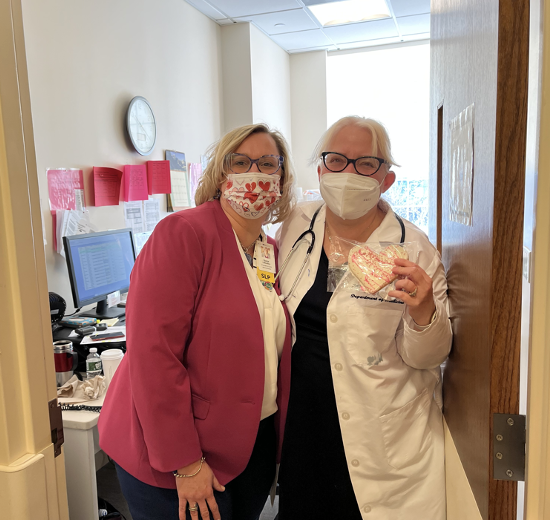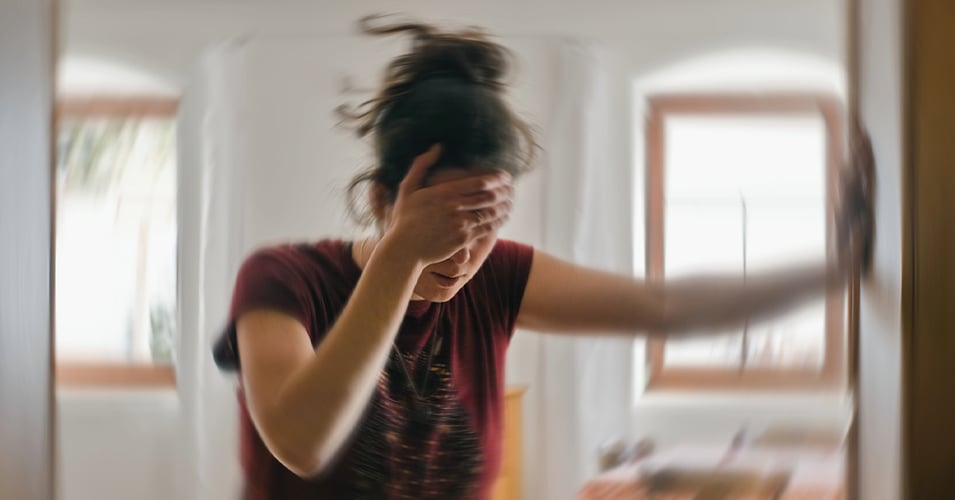
During the COVID pandemic, Gaylord quickly recognized the need to serve and support staff. "Our staff was dealing with COVID within their families and circle of friends. And then they were coming here to help patients. We were concerned about compassion fatigue," says Chris Babina, manager of care management.
Donors who felt strongly about staff resiliency offered financial support for programming. "We ran with this and expanded our service," says Dorothy Orlowski, patient relations and volunteer manager. A significant difference between these programs at Gaylord and other institutions is that they are included for both patients and staff and are free of charge.
One of the first staff offerings was for yoga classes (a similar offering is also available to patients through Therapeutic Recreation). Because of COVID restrictions, the remote classes were recorded and uploaded to a website where employees could access them at any time. Staff responded enthusiastically and even asked for specific exercises. For example, a payroll employee who sat at a desk all day asked for guidance on lower back strengthening exercises.
The next addition was chair massages for staff. "This was the most popular staff initiative," says Lorraine Cullen, director of respiratory and radiology. "I've had people stop me in the hallway when I was the name associated with the chair massage to tell me how wonderful it was to take 15 minutes and feel like their stress was relieved."
A much-appreciated staff treat offered during COVID was a wellness cart. Orlowski and Babina brought it through the hospital units on all three shifts to provide staff herbal teas, hot chocolate, hot cider, and healthy snacks like granola bars. The cart also offered inspirational cards with quotes designed to encourage the team.
"We were doing it on our own time," Orlowski says. "Doing whatever was needed address stress and make the staff feel appreciated for everything they're doing." The most significant addition to serving staff and patients is meditation and mindfulness. Gaylord partnered with the Copper Beech Institute in West Hartford to train six staff members to become certified mindfulness and meditation facilitators.
It is essential to be attentive to the needs of each individual during meditation and mindfulness sessions. "If somebody isn't walking, I might say, 'you might find yourself floating down this pathway,' you need to be mindful of the person's condition," Babina says. Orlowski remembers doing a gratitude-based meditation with a woman recovering from a stroke. "Afterwards, she said, 'That was beautiful. It was wonderful. For those 15 minutes, I forgot that I was in a hospital. I forgot about what happened to me; I felt whole.'"
Aromatherapy is the newest offering to provide an escape. Patients (barring contraindications such as reactive airway disease) and staff can get small stickers for their clothing that smell like soothing lavender, sandalwood, or lavender. If only for a moment, the sticker can transport someone from the hospital setting to a beautiful field of flowers.
"We run into nurses who say, 'Oh, I love these. I put them on my badge. When I take a break, I stop and take a deep breath," says Cullen. One patient who was having a hard day was offered an aromatherapy sticker by a nurse. The patient said it helped her relax and refocus, greatly impacting her feelings.
1.jpg?height=500&name=600600p1748EDNmainimg-Lisa-Kalafus_hands-blessed-(1)1.jpg)

